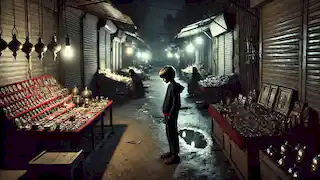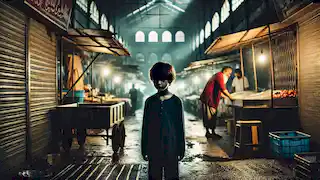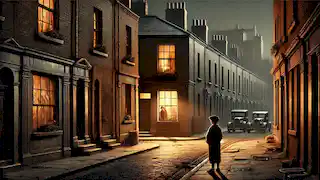The street was silent and desolate in the twilight, broken only by the cries of the neighboring children playing in the alley. The boy, our narrator, lived in one of the brown, drab houses on North Richmond Street, a place where the houses huddled together like brooding siblings under the heavy weight of Dublin’s gray skies. From his doorstep, the young boy gazed across at the house where Mangan’s sister lived, her mere presence intoxicating him with thoughts he could scarcely define but already felt with painful clarity. In the dim light, her figure became a bright symbol of unattainable beauty and idealism, an angel to his ardent heart.
From his house, he could see the half-lit doorway across the street where she would emerge every evening, and he would wait in an agony of anticipation for just a momentary glimpse of her. His obsession for her took root in his soul, a tangled mixture of youthful innocence and the burgeoning confusion of first love. Every detail of her became enshrined in his memory, her movements a silent ballet, her laughter a distant melody.
One day, she spoke to him. It was a fleeting moment, insignificant perhaps to her, but to the boy, it was everything. Mangan’s sister approached him one evening, the familiar twilight casting soft shadows over her face, and asked if he planned to attend the bazaar, Araby. The simple mention of the word sent a current of excitement through his veins. In her absence from the upcoming fair, she expressed wistfulness, voicing her own regret for being unable to go due to her convent obligations. His immediate, impulsive response was to promise to bring her something from the bazaar. It was a decision he made without hesitation, carried by the buoyancy of his infatuation and a desire to prove himself worthy of her notice. In his mind, this journey to Araby was not just about the promise but a spiritual quest, an opportunity to win her favor and to elevate his mundane existence to something more, something filled with light and beauty. Days passed. He thought of nothing but Araby. His schoolwork suffered, his duties at home became afterthoughts, and his waking dreams were consumed by visions of what the bazaar would offer him. He imagined the stalls brimming with exotic treasures, perfumed scents filling the air, and himself finding the perfect gift, one that would express all the feelings he had for Mangan’s sister but couldn’t articulate with words. He pictured her receiving it with wide eyes, her face lit with the same reverence he felt for her. The day of the bazaar arrived. All through the morning, the boy was restless, moving through his day as if in a trance. Time seemed to crawl as he awaited the moment when his uncle would return home to give him money for the bazaar. But the uncle was late, his absence turning the boy’s earlier excitement into growing frustration. The delay felt like a cruel cosmic joke, as though the universe itself was conspiring against his mission. Finally, in the late evening, after much delay, the uncle returned, indifferent to the boy’s frantic eagerness. The man handed him the money with a casual disregard, making a teasing comment as though the boy’s journey was little more than a whim. The boy, however, did not hear him, already rushing towards the train station, anxious to make his way to Araby before it closed. By the time the boy arrived at the bazaar, it was nearing the end of the event. The stalls, far from the vibrant and enchanting scene he had imagined, were mostly closing down, and the atmosphere lacked the magical quality he had envisioned. Instead, the boy was greeted with dimly lit booths, lackluster vendors, and a general sense of dullness that felt jarringly out of place with his grand expectations. The few remaining customers moved with disinterest, the promise of something extraordinary reduced to ordinary commerce. He wandered aimlessly through the half-deserted aisles, his heart sinking as he realized that the reality of Araby was far from the romantic ideal he had built in his mind. The items on sale were trinkets, commonplace and lacking the exotic beauty he had hoped to find. It was as though the bazaar itself mirrored his inner turmoil, the disparity between expectation and reality standing starkly before him. At one of the last open stalls, a young woman, barely paying him any attention, lazily showed him some porcelain vases and tea sets. Her voice was indifferent, her attitude detached. She exchanged casual banter with two Englishmen, their laughter striking him as shallow, a reminder of the world’s cruelty and his own insignificance. The boy’s earlier sense of purpose, the conviction that this journey had some deeper meaning, began to unravel. Suddenly, his reason for being there, the promise of a gift for Mangan’s sister, seemed foolish. The romantic quest he had imagined was no more than a child’s fantasy, and the weight of disillusionment fell heavily on him. His mind, once filled with grand ideas and noble intentions, was now empty, hollowed out by the bitter reality before him. He turned away from the stall without buying anything, his hope extinguished. The boy lingered for a moment longer, looking around at the remnants of the bazaar, the dim light casting long shadows across the closing stalls. The emptiness of the scene reflected the emptiness he felt within, the gap between what he had hoped for and what he had found now too wide to bridge. As he stood there, lost in his thoughts, a burning realization gripped him. The journey to Araby, the promise he had made, all of it had been driven by a desire to escape the monotony of his life, to find something that transcended the dullness of his daily existence. But in chasing after this ideal, he had forgotten that the world is indifferent to such dreams, that reality often falls short of the beauty we imagine. He had been a fool, led by his own naivety, and now he stood at the edge of his childhood, gazing into the abyss of disillusionment. The boy left the bazaar, his heart heavy, his eyes burning with unshed tears. The long walk home was a solitary one, and with each step, he felt the weight of his disappointment pressing down on him. The bazaar had been his chance to break free, to find something more, but instead, it had only confirmed what he had feared all along – that his dreams were just illusions, and the world would never live up to them. As he approached his street, the boy felt the last vestiges of his childhood slipping away. The image of Mangan’s sister, once so vivid and filled with light, now seemed distant, like a fading memory of a dream he could no longer hold onto. He knew that when he saw her again, the feelings he had once held would be changed, tainted by the harsh truth he had come to understand. He reached his house, the same brown, drab structure that had always been there, waiting for him. Nothing had changed, and yet, everything was different. The world had not shifted, but his view of it had. He no longer saw it through the lens of youthful idealism, but with the eyes of someone who had learned the painful lesson that reality is often far from the dreams we create. Inside, the house was quiet, save for the ticking of a clock in the hallway. His journey to Araby had ended, not with the triumph of a hero returning from a quest, but with the quiet resignation of a boy who had learned that the world was not what he had imagined. He sat in the dim light of the room, the sounds of the city drifting in through the open window, and for the first time, he understood what it meant to grow up. The darkness pressed in around him, and he let it. It was not the comforting darkness of a child’s room, but the cold, uncaring night of the world outside. He would carry this night with him for a long time, the lesson of Araby etched into his heart. The journey had ended, but the knowledge of what he had lost would stay with him, a quiet, persistent reminder that the world is not a place of magic and wonder, but one of limitations and broken dreams. In the silence, he closed his eyes, not to dream, but to accept the truth of the world he now saw with painful clarity.Rising Action
Climax

Falling Action

Resolution





















